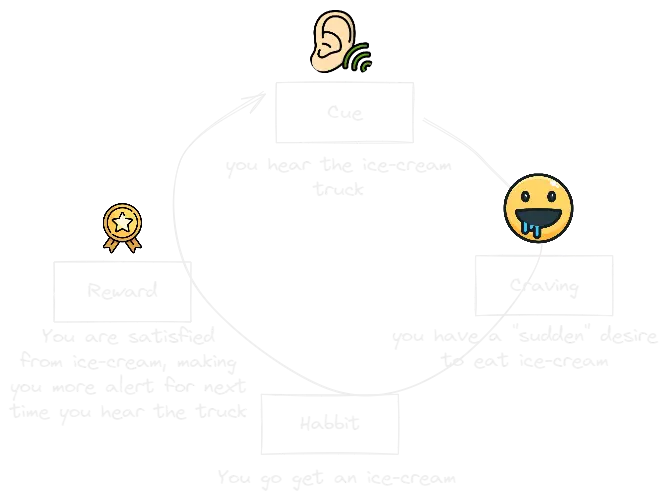The habit loop
Notes
a simplistic model of how our brain triggers, reinforce and operates habits:
- Cue - an external stimulus (conscious or subconscious) that the brain has attached an emotional/physical response to. This is usually some type of a dopamine expectation for a reward. for example, seeing a box of chocolates on the table
- Craving - the brain's response to the cue. for example - you wish to consume the chocolate on the table (you "expect" the great sensation and enjoyment from eating the chocolate)
- Habit - the act itself, when you go with your craving - i.e you eat the chocolate
- Reward - the happiness received from preforming the action.
Therefore, we can use this knowledge to our advantage. instead of using brute willpower Willpower is Limited, we can:
- make it clear - have an easy to measure goal so you could know when and how to reach it. for exp, the difference between "i will read more" to "i will read 25 pages every day". Clarity
- make it easy - i.e reduce Friction. our environment should support our habits. if it requires tools/devices, place them within reach/ease of use, set remainders, reduce distractions, schedule them in a time where you most likely could accomplish it, and set easy goals to start with and expand them later on. (for exp - don't start with 5 days 1 hour workouts, start with 2-3 practices of 20-30 mins). its connected to the the 20 seconds rule
- make it attractive/satisfying - do Temptation Bundling. make the habit task fun, could be with coupling it with an enjoyable rewards, such as fun music while running, etc... make sure that the reward isn't a bad habit in itself, such as eating unhealthy food.
- make yourself accountable - make sure someone, whether a friend, collogue, coach or an organization checks up on your habits and that you reach your goals, and set a "punishment" for not sticking to your habits, such as losing money. Accountability
Visual

Overview
🔼Topic:: Habits (Map) 🔼Topic:: Human Brain ◀Origin:: Atomic Habits (book) 🔗Link:: Atomic Habits